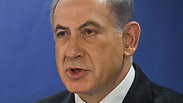
Prime Minister Netanyahu. Admitted the limitations of power
Photo: Reuters
On Saturday night, Israel did something it has refrained from doing so far during the war in Gaza: It initiated. Israel is no longer accepting imaginary ceasefires, no longer agreeing to hold fire for humanitarian reasons and making no more foolish attempts to reach an agreement when there is no one to agree with.
The cabinet's decision
not to let Hamas drag us deep into Gaza, and worse – into the underground Gaza, is as courageous, in my opinion, as a decision to leave the IDF inside the Strip. This decision is courageous because it requires the prime minister to look the bereaved families in the eye and tell them that Israel has achieved the goals of the war and that their sons; blood wasn't in vain.
As of Saturday night, Israel is taking the initiative into its own hands. It will decide when and how to act, how much force to use and against which targets to operate, and it will only do so according to its security interests. In other words, a unilateral IDF withdrawal and return to that same simple and catchy formula of "calm will be met with calm."
Protective Edge
Nahum Barnea
Analysis: IDF forces must leave Gaza now because they have no missions justifying their presence there.
It is courageous because requires him to look the southern residents in the eye and tell them that everything possible has been done in order to restore calm, and that they can return to their homes despite the fact that there is no submission and no agreement.
And most importantly, it requires great courage to look the Goldin family members in the eye and tell them that he is responsible for their son, but also for the safety of all the other IDF soldiers, and that every additional day they remain there exposes them to the danger that their son and the two fighters killed along with him were exposed to.
A day after Hadar Goldin was taken captive, his parents, brother and sister faced the cameras. Another beautiful, noble family, forced to expose itself under the most difficult, tragic circumstances. My heart went out Saturday evening to this united family. All its children, including the father, are IDF officers, people who are not detached from the Israeli existence but also stick to their religious faith.
The brother Tzur, who felt his twin brother was still alive; the father, Simha, whose private disaster took him back at once to his role as a retired regiment commander and who personally turned to the man who was his commander, Chief of Staff Benny Gantz; the mother, Hedva, who begged the state not to abandon her son; and his young fiancée, Edna, who promised Hadar they would still dance at their wedding.
This incident undoubtedly had a mental affect on the cabinet discussions about whether the fighting should go on and made things very difficult for Prime Minister Benjamin Netanyahu and Defense Minister Moshe Ya'alon and the rest of the cabinet members, who had to distance themselves from this impossible situation, which is completely against the IDF ethos they have been raised on, and not let it affect their decisions.
Netanyahu himself said Saturday night what we all know, even those who have been saying the opposite in recent weeks, and that's that Hamas cannot be destroyed and that Israel has no interest in reoccupying Gaza.
In the press conference, the prime minister basically admitted the limitations of power. Not a victory, but deterrence.
And to all those who plan to argue that the IDF withdrew before achieving its goals, Netanyahu mentioned those goals: To weaken Hamas and restore calm in the south – those were the modest goals he set on the eve of the operation, which were only joined by what was revealed at the start of the operation, those offensive tunnels whose destruction he promised Saturday night to complete.
The cabinet's decision to unilaterally withdraw from the Strip requires courage, as the prime minister knows that ending the war in Gaza this way marks the beginning of a new war: The war at home, against the trigger-happy leaders of the coalition parties, Avigdor Lieberman and Naftali Bennett; against his senior ministers, who smell Netanyahu's blood and are awaiting his downfall; against the Likud Knesset members, those people who sat in the air-conditioned television studios and urged Netanyahu to send the IDF deep into Gaza, to occupy, to govern, to control; and against his natural camp, the right-wing camp, which interprets the cabinet's sensibility as weakness.
Since we cannot know what would have happened if the IDF had continued the operation, and what kind of disasters were avoided thanks to the cabinet's decision to leave Gaza and not to continue the fighting in the refugees camps or in the alleys of Rafah and Gaza, there will always be those who will say that we were almost there, that we were about to reach the Hamas leaders, that we nearly eliminated them, that we could have destroyed this terror organizations.
And that if we had only done that, Gaza would have turned into Geneva.
But Netanyahu's most important sentence in the press conference had to do with the change in the political setting, which will have consequences even after the war. This is where we may find the chance for a change. This is where the seed of hope for a different reality in the Middle East may lie.
















